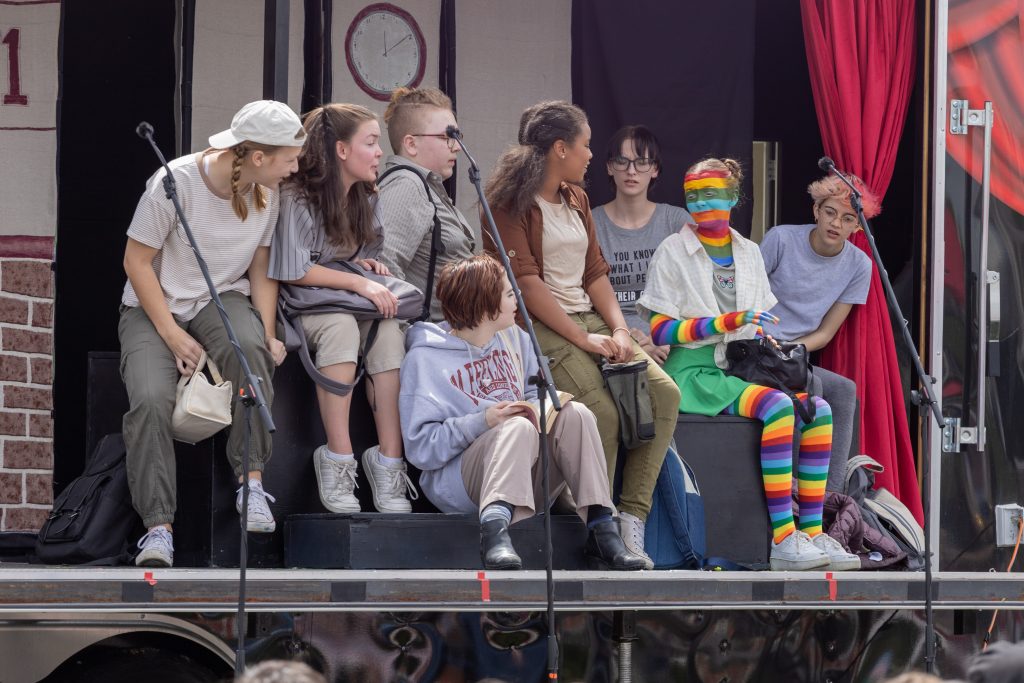Audition season is here! Feelings of accomplishment, excitement, and confidence are right around the corner for some. But for many, an entirely different experience is possible. Tears, disappointment, embarrassment, exclamations like:
“My life is over!”
“How can I possibly go on?”
“I’m never auditioning for anything ever again!”

The good news is, these moments are fantastic opportunities to honor your Theater Kid’s healthy emotional response AND help them make choices about how they will manage disappointment now and in the future.
- Validate
Allow your Theater Kid to feel upset. Honor their feelings of disappointment with words like, “It’s okay to be sad/angry/disappointed.” Help them articulate their feelings with questions like, “Do you want to talk about how you’re feeling? Can you think of another time you felt this way?” Try not to jump straight into processing and overcoming without first letting them sit with these feelings.
- Process
Process the disappointment with your Theater Kid. Let them talk about their situation and help them to understand the complex feelings they are experiencing. Oftentimes, children will need some redirection as they are processing. You might hear things such as, “I’m a terrible actor!” “Everyone else is better than me,” “The director hates me!” It can be helpful to remind your young performer of the complexity that comes with casting a show (keep reading for more details on that). Encourage your Theater Kid to focus on what is true and what they can control.
- Reflect
Ask questions about their audition, such as “Did you feel confident in your audition? What might have helped you to feel more confident? Did you listen to instructions? Were you prepared?” Reflect on what went really well and what could have gone better. Remind them that each audition is an opportunity to learn something new.
- Plan
Create a plan to help improve for their next audition. Encourage them to be excited about the next opportunity and to keep working towards their goals. Discuss possibilities such as taking more classes, attending an audition workshop, being better prepared for the next audition, practicing more frequently, working on listening skills and following directions. This is a great opportunity to show your Theater Kid that you believe in them and that you support them in their endeavors.

Casting a show is always complicated for casting directors, especially when working with young performers. Most non-theater folks don’t understand the amount of variables that are considered when casting. Here is a general idea of the six main things we take into account that determine our casting decisions. By explaining these to your Theater Kid, they will be able to broaden their scope, acknowledge what they can control in the casting room, and hopefully lighten the weight of their disappointment.
- Passion: Does this performer demonstrate a genuine desire to put in the time and work to produce great theater?
- Time: Does this performer (and their family) have the ability to make the time commitment required?
- Attitude: Does this performer have a positive, supportive, and inquisitive disposition? Do they follow instructions? We want to work with actors that want to work with us.
- Talent: Every person has talent. Does this person’s talents fit with what we need for this show? Every show has different needs and these needs will influence casting.
- Appearance: This is always tricky, but some roles demand a specific “look” or physical feature that not every performer has. Sometimes a specific height or hair color makes someone a better fit for a role, especially in relation to the other performers that are cast.
- Opportunity: We have been privileged to work with some extremely talented and genuinely wonderful humans – youth and adults. While we love every single one of them, we don’t always have a part for them. And it may be someone else’s turn to do some theater and life-skill learning.

Here are some things we recommend avoiding as you are helping your Theater Kid manage their disappointment.
- Dismissing your child’s feelings: Avoid saying things such as “It’s not that big of a deal,” “Life goes on,” “You’ll live.” These phrases shut down an opportunity to show your young performer what healthy emotional processing looks like. Validate their feelings and then come up with a plan to move past them.
- Discussing the merit of others: Avoid putting others down as an attempt to make your Theater Kid feel better about themselves. Whether it’s about the other actors or the directing team, putting others down or discussing other people’s motives is not appropriate or beneficial, and it can lead to unhealthy coping mechanisms.
- Overindulging in praise: Listen and validate feelings, but don’t inflate skills and abilities to try and make your Theater Kid feel better. Be honest with your young performer and keep it real. It’s better to offer praise such as, “I can tell you practiced so hard for this audition,” “I’m so proud of you for being a good listener and following instructions,” “Your dance audition was much cleaner than it was last time,” rather than, “You have the most beautiful voice in the world,” “Your audition was so incredible,” “Your dance audition was way cleaner than all the other boys your age.” Offer praise in areas that reflect their hard work and persistence, rather than inflating their natural talents or comparing their skills to others.
When in doubt, remind your Theater Kid that even Fred Astaire, the triple threat Broadway legend, was rejected at an audition with the notes, “Can’t act. Can’t sing. Slightly bald. Can dance a little.” True story!




